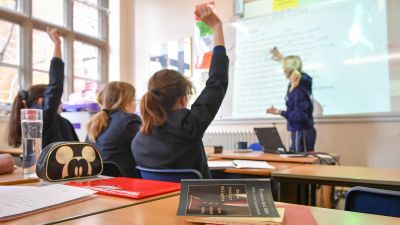A Cost of Learning Crisis? Schools battling to retain teachers as trainee numbers drop by 28%

A shortage of qualified teachers risks building resentment among pupils, increasing their anxiety and shattering their faith in their schools, a headteacher has warned.
Recruitment to teacher training programmes this year is down 28% compared with 2020 - with all but four subject areas failing to meet their targets for trainees.
Ministers say recent data shows there are record numbers of full-time teachers in England and "the majority of subjects continue to be taught by specialists".
But school leaders told ITV News they were struggling to fill vacancies as experienced staff decide to leave in search of less stressful and challenging workplaces.
The exclusive research is the basis of the series A Cost of Learning Crisis, which includes responses from 250 headteachers about the reality of life in schools in 2023.
For Claire Sparkes, this term marks the end of a 10-year teaching career.
After three years of struggling with her mental health - and despite support from her headteacher - she has decided to leave her job at Framingham Earl High School near Norwich.
"I just think the trade off for me, between workload and my life, is not one that can be sustained anymore," she said.
"When I told all my friends and family [I was leaving], not one person said 'Are you sure?'.
"I have done this for 10 years, and worked really hard but it has come at a personal cost.
"It's got to the point where it's not worth it anymore. I was getting chest pains and driving to work and just not wanting to get out of my car. I'm empty. The tank is empty."
Dave Lee-Allan, headteacher at Stowmarket School in Suffolk, said he had lost several high-quality teachers since the pandemic - many of whom blame the increased pressure and workload.
But with fewer trainee teachers joining the profession, filling those gaps has proven a challenge.
"The number of subjects that are difficult to recruit to is increasing," he said.
"Traditionally strong areas like English are suddenly not attracting teachers. History, business studies, health and social care, drama - all of these are subjects that are causing us challenges."
According to the latest statistics from the Department for Education, just under 29,000 were enrolled on initial teacher training courses this academic year - down from more than 40,000 in 2020.
Physics, computing, modern foreign languages, and business studies failed to meeting even half of their recruitment targets.
Marie Lally, headteacher at Earls Barton Primary School in Northamptonshire said it was not a surprise.
"It's not an attractive profession," she said. "If it was an attractive profession with brilliant holidays, then every graduate would want to come into teaching - and they don't. And I think we really have to look at why."
One reason, she believes, is the pay - something which will see existing teachers walking out again next month after the announcement of two further strikes on 5 and 7 July.
The government insists it is doing all it can to make teaching more attractive. That includes bursaries worth £27,000 tax-free and and scholarships worth £29,000 tax-free, which encourage talented trainees to teach key subjects such as mathematics, physics, chemistry and computing.
Explore the responses from 250 headteachers for yourself in this interactive graphic
The starting salary for teachers is now around £30,000 but, despite seeing an almost £7,000 rise since 2010, it has fallen well short of inflation.
"I think the public perception of what teachers do and what teachers earn is misguided," Ms Lally added.
In the East of England, teacher training recruitment is down 30%.
Mr Lee-Allan, who chairs the Suffolk Association of Headteachers, said some schools in the county were having to rethink the subjects on their curriculum because they could not find teachers to teach them.
He worries about the effect it will have on students.
"It's an immediate impact when there is not a qualified teacher in front of them. The delivery of the content on the curriculum is diminished - and they immediately know that," he said.
"They start to lose faith in the system, in themselves, in the school.
"It increases their anxiety, their feeling of hopelessness. They feel there is nothing they can do because they haven't got the right teachers in front of them. It's building resentment and it's building worry.
"Teachers make the difference. We all have teachers that inspired us and gave us that love of learning. If you haven't got that person doing that... it's going to significantly diminish the quality of education you receive."
But there is a glimmer of hope. At the University of Cambridge's Faculty of Education, the latest cohort of student teachers is preparing to go solo in the classroom having finished training last week.
Come September, Hannah Woodhouse, 22, will be teaching at a primary school in the city.
She said her mentors had always been open with her about the challenges schools face but it had not dampened her enthusiasm to become the kind of teacher she was inspired by when she was young.
"I feel like I'm ready," she said. "I feel like I'm going to experience every single emotion. There are going to be challenges. There are going to be highs and there are going to be lows - but the highs really outweigh the lows."
William Hammerton, 22, will join the country's increasingly rare band of modern foreign languages teachers.
He has followed news of striking teachers closely and sees the strength of feeling as a positive.
"It tells me there is a passion for this. People will fight and defend this as a profession," he said. "Me entering that doesn't discourage me."
Does your school have a story to tell? Contact us at anglianews@itv.com.
Want a quick and expert briefing on the biggest news stories? Listen to our latest podcasts to find out What You Need To Know